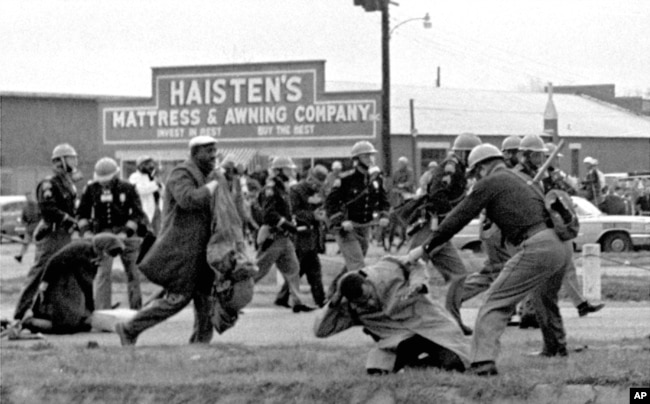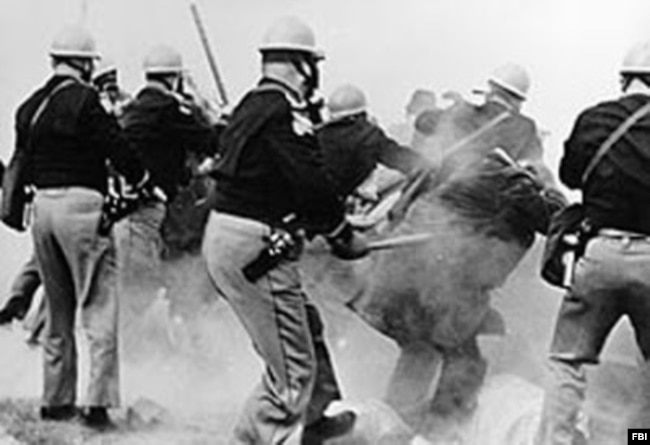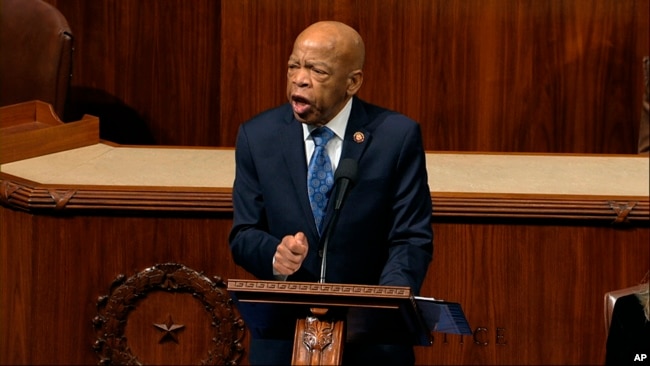America lost an extraordinary leader Friday when Congressman John Lewis died of pancreatic cancer. He was 80 years old.
The lawmaker representing Georgia fought for civil rights for most of his life. He was the last living member of the so-called “Big Six” activists, a group that included Martin Luther King, Jr.
A son of Alabama sharecroppers, his place in the leadership of the 1960s campaign for Black equality had its roots in that difficult life on the farm.
Lewis was the youngest member of the Big Six. He helped organize the 1963 March on Washington for Jobs and Freedom. He spoke to the huge gathering in the nation’s capital shortly before King gave his famed “I Have a Dream” speech.
King’s speech marked a turning point in the civil rights struggle. But the struggle was still far from over. Two years later, police beat Lewis bloody and broke his skull as he led hundreds of marchers across the Edmund Pettus Bridge in Selma, Alabama.
The violence came to be called Bloody Sunday. Television images of the violence helped unite national opposition to racial oppression.

FILE - Alabama state troopers use clubs against voting rights marchers in Selma on March 7, 1965. At foreground right, John Lewis, chairman of the Student Nonviolent Coordinating Committee, is beaten. (Associated Press)
Leaders in Washington felt the pressure. The 1965 Voting Rights Act passed five months later. The law barred racial discrimination in voting, acts of which were widespread across the South.
Lewis returned to that bridge many times following his election in 1986 to the U. S. House of Representatives. He often took along lawmakers from both major political parties so they could see where the attack took place.
Lewis earned respect in Washington from Democratic and Republican lawmakers. Many called him the “conscience of Congress.”
And, he was a guiding voice for a young Illinois senator who became the first Black president.
“I told him that I stood on his shoulders,” former President Barack Obama wrote in a statement marking Lewis's death. He added, “I told him I was only there because of the sacrifices he made.”
Lewis was 23 years old when he joined King to plan the March on Washington. He gave a fierce speech at the event to hundreds of thousands of demonstrators.
But it was not as fierce speech he had planned to give. Lewis agreed to make several changes to soften the speech under pressure from President John F. Kennedy’s administration and others. But he still spoke strongly and without compromise for social revolution.

On 'Bloody Sunday,' March 7, 1965, Alabama police attack Selma-to-Montgomery Marchers, injuring about 70 protesters. (Source: FBI)
In early 1965, Lewis led hundreds of demonstrators in a march in his home state of Alabama. They planned to walk 80 kilometers from Selma to the capital, Montgomery.
They did not get far.
Police blocked them on a Selma bridge. The police used clubs to beat protesters, fired tear gas at them and rode into the crowd on horseback. Many marchers were sent to hospitals. The nation was horrified.
“The sight of them rolling over us like human tanks was something that had never been seen before," Lewis later wrote. "People just couldn’t believe this was happening, not in America.”
The 'boy from Troy'
Lewis was born on February 21, 1940, near the small Alabama town of Troy. He attended segregated public schools.
He was a teenager when he first heard Martin Luther King, Jr., speak on the radio as a young clergyman. They met after Lewis wrote him seeking support to become the first Black student at his local college. Lewis went on to go to college in Nashville, Tennessee, instead.
Soon, the young man King called “the boy from Troy” was organizing sit-ins at whites-only restaurants and volunteering as a Freedom Rider. Lewis suffered many police beatings and arrests in the fight against segregation around the South.
Lewis helped form the Student Nonviolent Coordinating Committee, or SNCC. He led the powerful group from 1963 to 1966 and continued civil rights work and voter registration campaigns for many years. In 1977, President Jimmy Carter appointed Lewis to lead ACTION, a federal volunteer agency.

FILE - Democratic Congressman John Lewis speaks as the House of Representatives debates the articles of impeachment against President Donald Trump, at the Capitol, in Washington, Dec. 18, 2019.
Lewis refused to attend Donald Trump’s presidential inauguration in 2017. He argued that Russian interference in the election process made it unlawful. Lewis also did not attend presidential events that followed, including the yearly State of the Union speeches presented before Congress.
Trump was criticized for his lack of public comment after Lewis’s death. Fourteen hours after the news broke, Trump wrote on Twitter: “Saddened to hear the news of civil rights hero John Lewis passing. Melania and I send our prayers to he and his family.”
Trump also ordered all flags to be lowered at the White House and federal grounds and buildings on Saturday.
Lewis announced in late 2019 that he had pancreatic cancer. “I have never faced a fight quite like the one I have now,” he said at the time.
Lawmakers John Lewis and Nancy Pelosi hold hands while singing "We Shall Overcome" at the Capitol Building in Washington June 23, 2016.
The Speaker of the House of Representatives, Nancy Pelosi, spoke about Lewis Monday on an American news show. She said she had talked to him the day before she died.
“It was a sad one,” Pelosi said of their talk. “We never talked about his dying until that day.”
Lewis was known for getting into what he called the “good trouble” of activism. In June of 2018, he wrote on Twitter: "Do not get lost in a sea of despair. Be hopeful, be optimistic. Our struggle is not the struggle of a day, a week, a month, or a year, it is the struggle of a lifetime. Never, ever be afraid to make some noise and get in good trouble, necessary trouble."
Earlier, this year he had a similar message of support for Black Lives Matter demonstrators around the world.
"Justice has, indeed, been denied for far too long, he said. “Organize. Demonstrate. Sit-in. Stand up. Vote.”
Words in This Story
sharecropper -n. a farmer especially in the southern U.S. who raises crops for the owner of a piece of land and is paid a portion of the money from the sale of the crops
conscience -n. the part of the mind that makes you aware of your actions as being either morally right or wrong
segregated -adj. divided in facilities or administered separately for members of different groups or races
despair -n. the feeling of no longer having any hope
optimistic -adj.having or showing hope for the future: expecting good things to happen